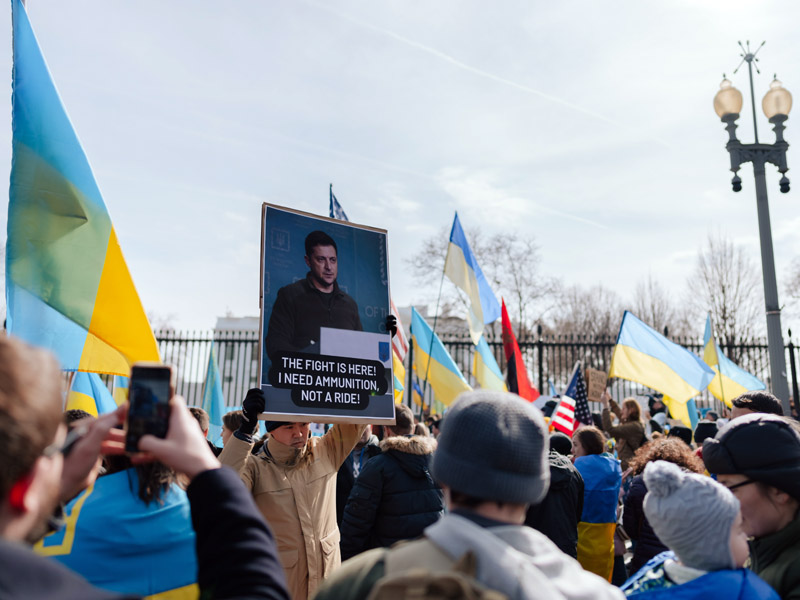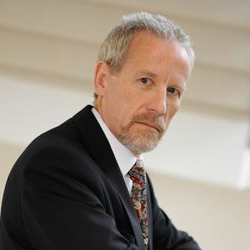
by Professor Keith Grint
- 7 March 2022
Share:
Thirty years ago, in 1992, Francis Fukuyama predicted that the end of the Soviet Union would usher in a global age of Western liberal democracy: In effect we were about to witness “the end of history.” As I write this, on March 5, 2022, day 9 of the Russian invasion of Ukraine, or the “special operation of liberation” as Putin calls it in his Orwellian double-speak, we are actually witnessing a repetition of history, rather than its demise. What happens in the future is anyone’s guess. The BBC correspondent, James Landale, suggests that there are five possible scenarios: Short War, Long War, European War, a Diplomatic Solution, or Putin is removed in a mutiny or a coup. The latter might look appealing, but it’s unlikely in the short run, at least until Russian casualties mount rapidly, the economic sanctions force the population onto the streets in mass numbers — and the elite decide to act. Nor would a NATO-enforced No Fly Zone (NFZ) work because the problem is less the use of airpower by the Russians and more their use of rockets and artillery, neither of which would be prevented by a NFZ. In effect, all that a NFZ would achieve is the beginnings of WWIII not the saving of the Ukrainian people. This, as Watters (2017) describes in a much smaller scale but equally cruel moral problem in the Bosnian War, is a “wrong-wrong dilemma” where the decision is not what is the right thing to do, but what is the least wrong thing to do?
In war, since that is what this clearly is, we have known since the time of Aeschylus and Sun Tzu that truth is the first casualty. Putin’s narrative concerns the alleged mendacity of NATO, the “Nazification” of the Ukraine, and the call for help from besieged ethnic Russians in Ukraine. But it is also locked into an overall strategic goal: MRGA — the Make Russia Great Again story. Over the last decade, this kind of nationalist appeal has been used by right-wing populist leaders the world over. This feeds the victim-claims of many of the supporters of such men — and they are always men — and makes the chances of dissuading them from their stories of robbed elections or stolen status very hard to eliminate. The attempt to control this particular narrative also explains the attempts to crush not just dissent but the communication of alternative narratives. This is, perhaps, best captured in the Ukrainian responses to the Russian troops — stopping them with either weapons or protests and treating them (rightly) as occupiers “оккупанты.” As Zoya Sheftalovich (2022) suggests, if the Russian troops were told by their own government that they would be liberating the Ukrainians from their own government and would welcome them with open arms, they were wrong. As she concludes, “It’s hard to shoot Babushka in cold blood” (Sheftalovich, 2022b). With over 1 million refugees, an increasingly despoiled Ukraine, and the end of anything like a free press in Russia, the construction of false narratives is proliferating. With access to news limited to Russian state TV, it would appear that many Russians either accept the Kremlin’s version of events or are not in a position to do anything about it.
But Putin probably did not reckon with the extent of Ukrainian resistance, never mind the significance of Western economic sanctions, especially given that Russia has amassed something like $469-$630 billion in reserves in the last two decades, primarily through the sale of gas and oil. However, not much of that money is held in cash in Russia. Most is held in foreign exchange reserves that Putin is no longer able to access. This explains the drop in the value of the Ruble by around one third since the war began. That, in turn, has led to Russia doubling its domestic interest rates to 20 percent which, by definition, will hit the standard of living of most Russians and has generated long queues of people outside ATMs. However, Putin’s most important support does not come from the citizens of Russia but from the military-political elite and the roughly 500 oligarchs that have benefitted from his administration. Many of these live in so-called “Londongrad” and keep their money in one of many offshore accounts to avoid British taxes and British oversight. Indeed, something like £68 billion of Russian money sits in such shell companies and 10 percent of all houses in central London are owned through this mechanism (including 6,000 houses in Chelsea and Kensington alone). Given that Russians have provided the Conservative Party with £2 million since Boris Johnson became Prime Minister, it is unsurprising that the British Government has been rather lethargic in investigating the legitimacy of this kleptocracy, despite the fact that this ought to be the real target of sanctions given the oligarchs’ support for Putin (Blakeley, 2022). Of course, whether seizing the super yachts of oligarchs or ratcheting up the financial cost of war will actually force Putin to desist is another matter.
So why did Putin take such a reckless gamble? Well, he might have watched the West allow the Taliban to walk into Kabul with little resistance and taken that as evidence the West would not stop him in Ukraine. After all, they did not stop him taking Crimea. And yet the god of irony has a remarkable ability to screw things up: If Putin’s intent in this was to inhibit the growth of the EU and NATO, then it’s likely that the opposite is going to happen; if he thought Ukraine was never really a nation, then it is now — as a direct consequence of the invasion. But will he succeed in crushing the Ukrainian resistance? There are several aspects of this to consider.
Sun Tzu suggests that unless you want to destroy your enemy, you must allow them a Golden Bridge over which to escape.
The first is the difference between Constructive Dissent and Destructive Consent. Abbas Gallyamov, Putin’s former speech writer, said on BBC Radio 5 Live recently, that Putin expected the Ukrainians to surrender almost overnight. The reason his expectations were so far removed from reality was because he never heard “objections or criticism” from those around him. In effect, he became a “victim of his own system.” This problem is common to many authoritarians, especially those in power for a long period of time during which all dissenters, however constructive, are weeded out and replaced by Yes-People or sycophants, that is destructive consenters. It is also the consequence of what Collinson (2012) calls Prozac Leadership: an unremittingly over-positive spin on events from the top, because dissent is crushed and bad news eliminated.
The second aspect is the relationship between management and leadership. If Putin’s war does not go as smoothly as he planned, it may well be because he is replicating the military mistakes made by two of his predecessors in this exact geographical region: Napoleon and Hitler. Both these two overestimated the importance of actual fighting and underestimated the importance of logistics. Napoleon was forced into a catastrophic retreat from Russia in 1812 because he had not taken into account the effects of a prolonged campaign during the Russian winter, and his troops died in droves from cold, hunger, and guerrilla attacks by the Russians. In the winter of 1941/2, Hitler’s Wehrmacht did much the same thing as Operation Barbarossa ground to a halt in the Russian mud because Hitler had assumed the Red Army would collapse, so there was no requirement to take winter supplies. In effect, both Hitler and Napoleon considered combat as more important than logistics — the very opposite of the Western Allies in 1944-45 (Grint, 2014). In other words, if you don’t get the management right, the leadership cannot compensate for the weaknesses that exposes.
The third aspect is to think about the relationship between confidence and knowledge. In Donald MacKenzie’s 1990 book, Inventing Accuracy, he constructed a “U Curve of Ignorance” which established that the more you knew about missiles, the less confident you were about their performance — because experts knew what could go wrong. Whereas those ignorant of the inner workings of missiles were supremely confident about their capabilities — on the basis of almost total ignorance. This relationship was subsequently known as the Dunning-Kruger Effect and explains why people who know virtually nothing about vaccines, for example, are so confident in their understanding of their effects. Indeed, in Motta et al.’s (2018) paper, those who scored the lowest in the knowledge test about vaccines were the most confident in their certainty that they knew far more than the scientific experts. Not only does this explain a lot about responses to Covid vaccines but it also explains Putin’s miscalculation about the Ukrainian resistance: On the basis of self-evident ignorance, Putin claims to know all about Ukrainians.
The fourth aspect of understanding the likelihood of the outcome of the war is to invert the problem and think about it from Putin’s perspective. As Sun Tzu suggests, one of the first rules of war is to understand your enemy, and for leaders such as Putin and indeed ex-President Trump, one critical issue to bear in mind is the power of shame and the loss of face.
In Trump’s case we might go back to the 2011 Annual White House Correspondents’ Association dinner in Washington, D.C. where President Obama decided to respond to Trump’s slandering of his birthplace and legitimacy by mocking him relentlessly — in public. “I know that he’s taken some flack lately,” said Obama, “—no one is prouder to put this birth-certificate matter to rest than the Donald. And that’s because he can finally get back to the issues that matter, like: did we fake the moon landing? What really happened in Roswell? And—where are Biggie and Tupac?” Trump’s response, as described by Adam Gopnik (2015), was remarkable. There was “No head bobbing or hand-clapping or chin-shaking or sheepish grinning—he sat perfectly still, chin tight, in locked, unmovable rage.” Indeed, one might argue that much of Trump’s presidency was based on reversing everything Obama had achieved in his presidency because of this evident public shaming.
A similar problem now faces Putin: It may well be that the deeper motivation for the invasion is an attempt by Putin to roll back history and return to the “glory days” of the Soviet Union through another Great Patriotic War; much in the same way that Hitler fed off the shame of German defeat in the First World War. But if, like Hitler, Putin accepts he has failed, the difficulty he has is how can he order the withdrawal of Russian troops without a catastrophic loss of face? Hitler’s take on this problem was his nihilistic scorched earth policy in 1945 that was to consign Germany to ruins, its self-inflicted Götterdämmerung1. There is an alternative: Sun Tzu suggests that unless you want to destroy your enemy, you must allow them a Golden Bridge over which to escape. In effect, Putin needs to find a way to leave so that he can go back to his politburo in Moscow and proclaim that he has won — or at least not lost. This is doubly difficult for his opponents having suffered the consequences of Putin’s mendacity, but the choice might not be between losing to Putin or beating him, the choice might be between saving Ukraine from further depredations or allowing it to be destroyed. That seems a tall order and the consequences are relatively predictable: As in almost all human history, a scapegoat will be required to explain the failure and feed the appetite rooted in shame. In short, Putin must either succeed or pay the ultimate price for his failure.
Putin’s opponent, on the other hand, the Ukrainian leader Volodymyr Zelensky, is famous for his resilience and ability to rally Ukrainians to the colors as exemplified with his alleged response to an offer from the USA to flee the country: “I need ammunition, not a ride,” (The Associated Press, 2022). Contrast this with Ashraf Ghani, the Afghan President, who fled Kabul in the face of the Taliban advance in September 2021. Zelensky’s background as a comedian is sometimes held against him, as if a sense of humour is somehow anathema to serious decision-making. I have worked with ten academic deans in my career and only two were arrogant narcissistic authoritarians — and neither had a sense of humor. Life, as Albert Camus constantly reminded us, is absurd — but that’s exactly why we should retain a sense of irony and humility. Life can be so absurd and so disheartening that retaining a sense of humor is not counter-productive but actually essential. As I heard one British commentator recently suggest on television, “If the Russians don’t back off, we will send them our Prime Minister and Foreign Secretary.”
But what is the point of resistance in the face of overwhelming material superiority when the likelihood of success is both limited and distant? Oftentimes the importance is symbolic — but that does not mean it’s irrelevant. Far from it, the defenders of Snake Island who appear to have died having emphatically rejected the call to surrender from a Russian warship (“Go f*** yourself” was the apparent response (Vistonay, 2022)) will undoubtedly go down in history as heroes of the resistance. Similarly, in France, in 1941, Jean Texcier (a civil servant) wrote the 33 Conseils à L’Occupé (33 Hints to the Occupied), which was copied endlessly. It suggested that the French should not treat the Germans invaders as tourists but as conquerors; but they should remain politely aloof from them, and they should store up their anger rather than express it directly, since that would lead to reprisals and executions. As one French woman, Agnès Humbert, wrote in her diary on finding a copy: “Will the people who produced the 33 Conseils à l’occupé ever know what they have done for us?… A glimmer of light in the darkness…Now we know for certain that we are not alone. There are other people who think like us, who are suffering, and organizing the struggle” (Humbert, 2008/Paris, 18 August 1940). Indeed, there are. War brings out the worst and the best in people. For every despicable killing in Ukraine, there is an act of human kindness — in Germany or Poland where civilians are offering their homes to Ukrainian strangers or in places further afield where those far from the conflict are collecting warm clothes, food, and toys to be sent to the refugees. In 1941, Germany and Poland were the last places a refugee wanted to end up; now they are the places of choice. Do not give up on humanity.
Acknowledgements: Thanks to David Collinson for his help with this blog.
End Note
Wagner (Hitler’s favourite composer) used the term, Götterdämmerung, as the title of the last of his ring cycle operas, Der Ring des Nibelungen, to denote the final clash of the gods in Norse mythology that would destroy the world prior to it being reborn.
References
The Associated Press. (2022, February 25). Live Updates: Zelensky Declines US Offer to Evacuate Kyiv. https://apnews.com/article/russia-ukraine-business-europe-united-nations-kyiv-6ccba0905f1871992b93712d3585f548
Blakeley, G. (2022, March 1). Punish the Oligarchs Not the Poor. Tribune Magazine https://tribunemag.co.uk/2022/03/russia-ukraine-invasion-putin-economic-sanctions
Collinson, D. (2012). Prozac Leadership and the Limits of Positive Thinking. Leadership, 8(2), 87-107. https://doi.org/10.1177/1742715011434738
Fukuyama, F. (1992). The End of History and the Last Man. Free Press.
Gopnik, A. (2015, September 12). Trump and Obama: A Night to Remember. The New Yorker. https://www.newyorker.com/news/daily-comment/trump-and-obama-a-night-to-remember
Grint, K. (2014). The Hedgehog and the Fox: Rethinking D-Day. Leadership, 10(2), 240–260. https://doi.org/10.1177/1742715014526479
Humbert, A. (2008) Résistance: Memoirs of Occupied France (B. Mellor, Trans.). Bloomsbury (Original work published as Notre Guerre, 1946)
Landale, J. (2022, March 3). Ukraine: How Might the War End? Five Scenarios. BBC. https://www.bbc.co.uk/news/world-europe-60602936
MacKenzie, D.A. (1990). Inventing Accuracy: A Historical Sociology of Missile Guidance. MIT Press.
Motta, M., Callaghan, T., & Sylvester, S. (2018). Knowing Less but Presuming More: Dunning-Kruger Effects and the Endorsement of Anti-Vaccine Policy Attitudes. Social Science & Medicine, 211, 274-281. https://doi.org/10.1016/j.socscimed.2018.06.032
Sheftalovich, Z. [@zoyashef]. (2022, March 1). This is super confusing for the soldiers. They believed they were the good guys, coming to liberate oppressed Ukrainians[Tweet]. Twitter. https://twitter.com/zoyashef/status/1498797437439590400
Sheftalovich, Z. [@zoyashef]. (2022b, March 1). It’s hard to shoot babushka in cold blood. 19/19[Tweet]. Twitter. https://twitter.com/zoyashef/status/1498797624203554816
Visontay, E. (2022, February 25). Ukraine Soldiers Told Russian Officer ‘Go Fuck Yourself’ Before They Died on Island. The Guardian. https://www.theguardian.com/world/2022/feb/25/ukraine-soldiers-told-russians-to-go-fuck-yourself-before-black-sea-island-death
Watters, B. S .C. (2017). Leadership in the ‘Wicked’ Problem of Bosnia’s Civil War: A Case Study Examining Ethical Decision Making Under Duress. Leadership, 15(1), 3-26. https://doi.org/10.1177/1742715017725641

Keith Grint is Professor Emeritus at Warwick University. He has held Chairs at Cranfield University and Lancaster University and was Director of Research at the Saïd Business School, Oxford University. He is a Fellow of the International Leadership Association (ILA) and Professorial Fellow of the Australian Institute of Police Management (AIPM). He is also a founding co-editor with David Collinson of the journal Leadership, and co-founder of the International Studying Leadership Conference. He received ILA’s Lifetime Achievement Award in 2018. His books include The Arts of Leadership (2000); Organizational Leadership (2005); Leadership: Limits and Possibilities (2005); Leadership, Management & Command: Rethinking D-Day (2008); Leadership: A Very Short Introduction (2010); and Mutiny and Leadership (2021).

